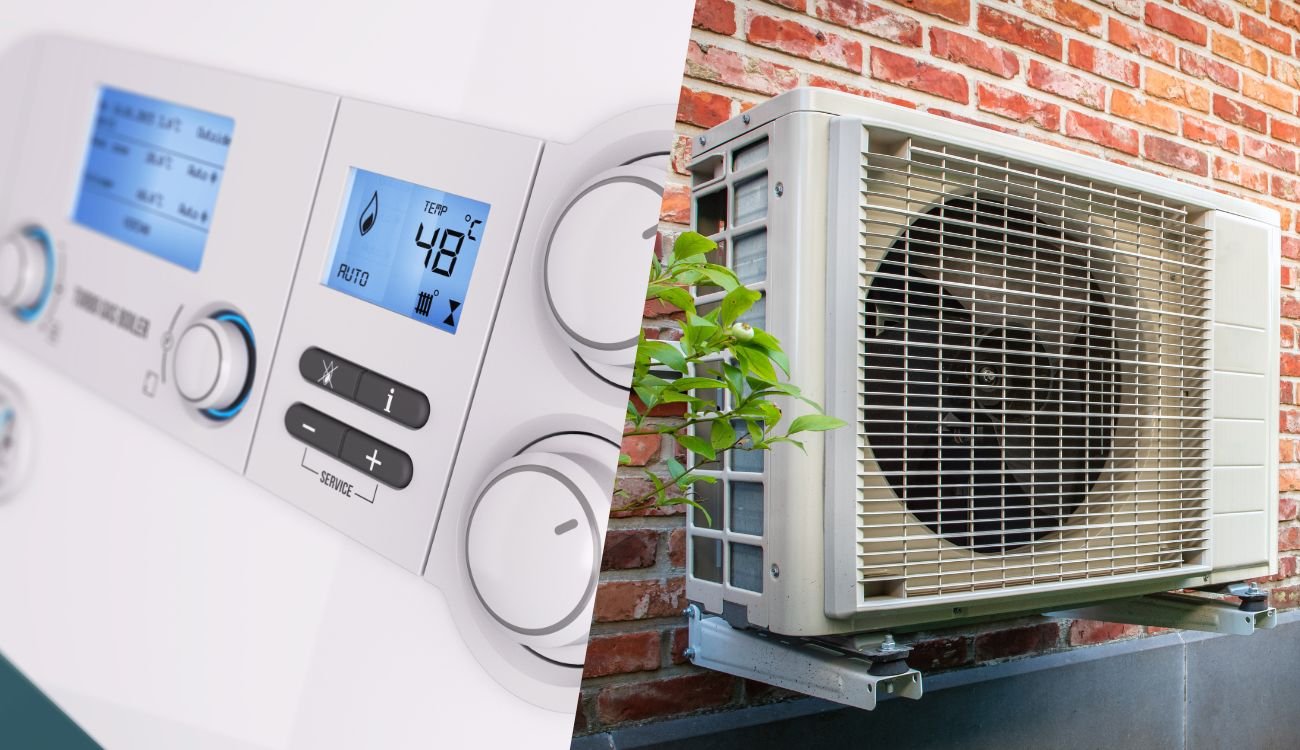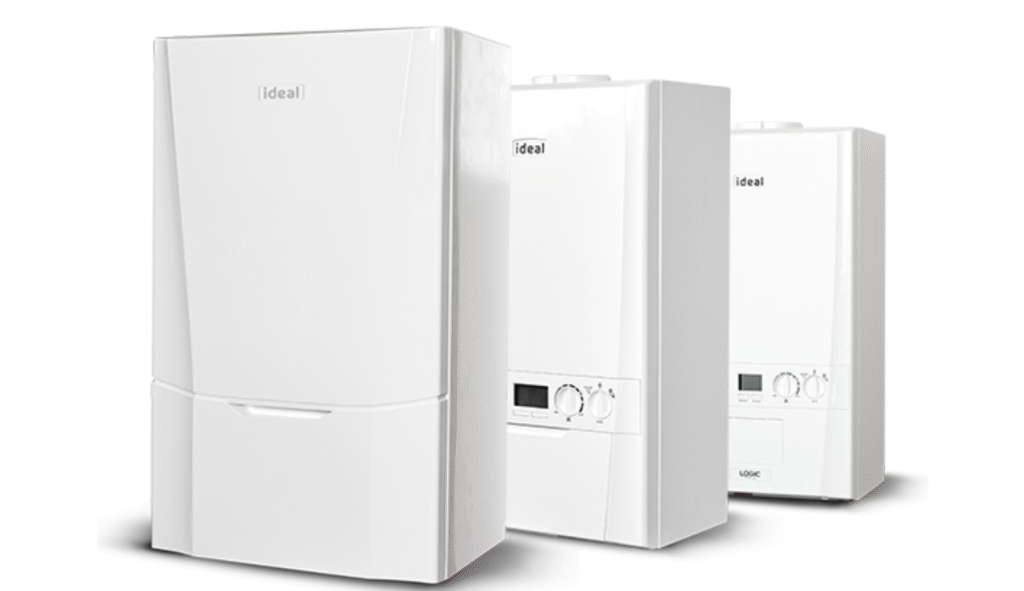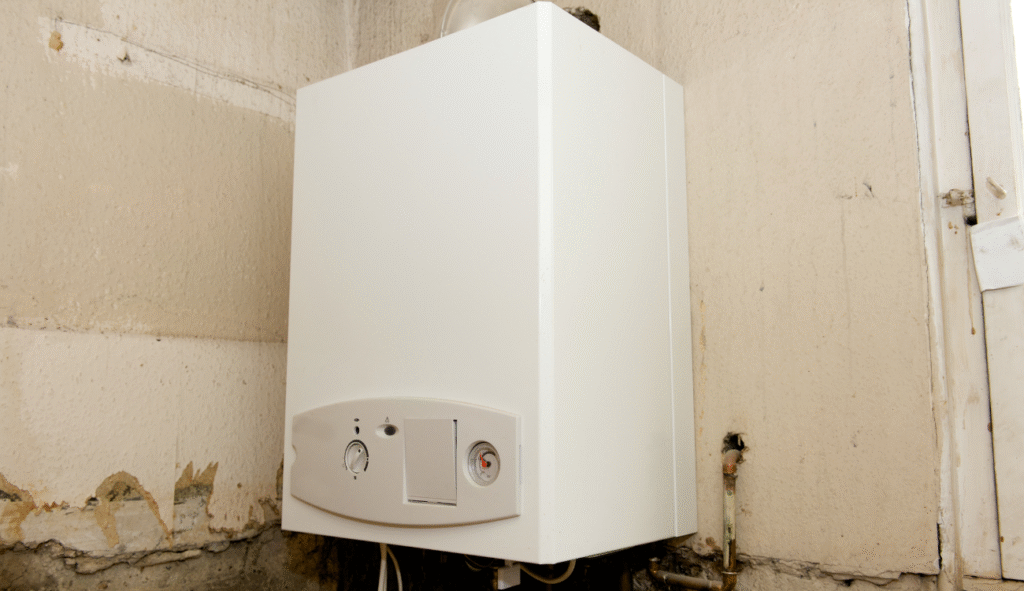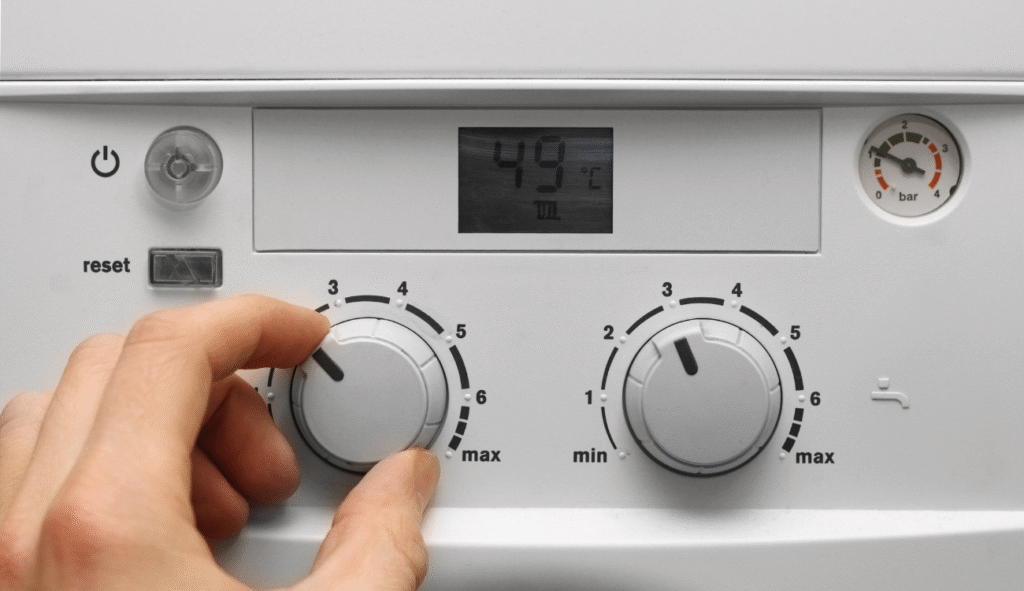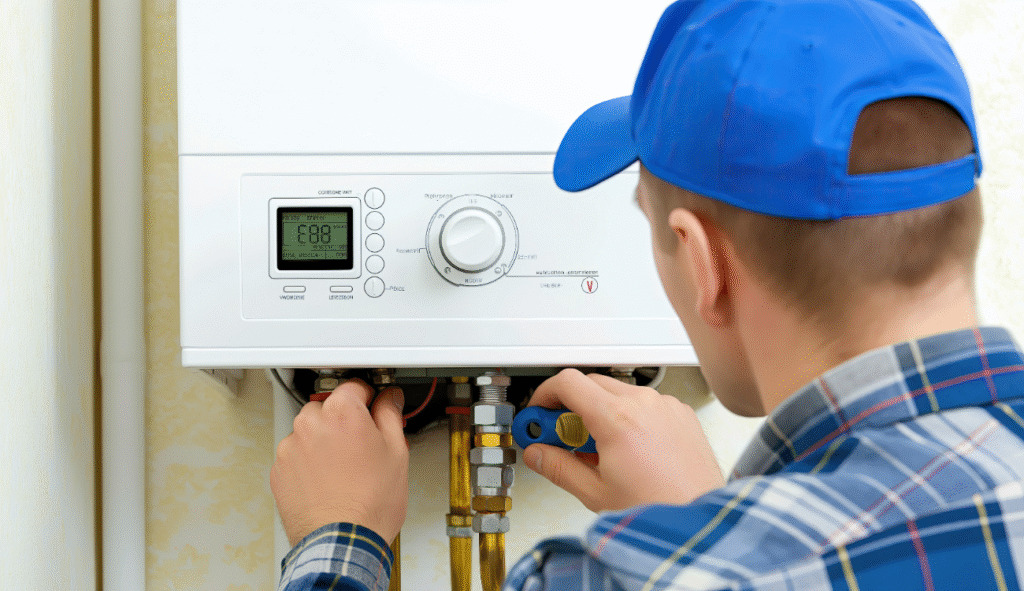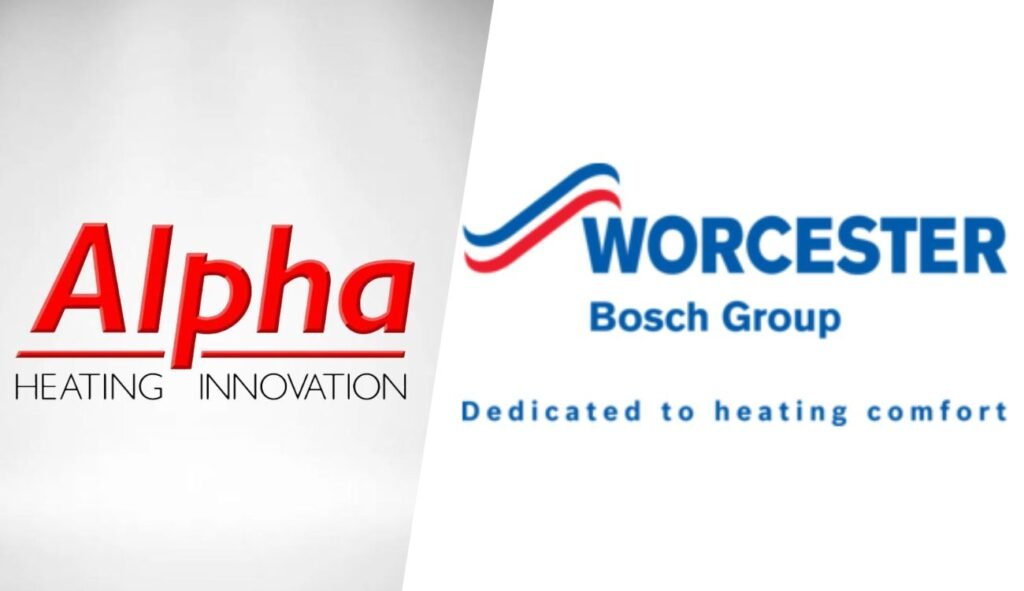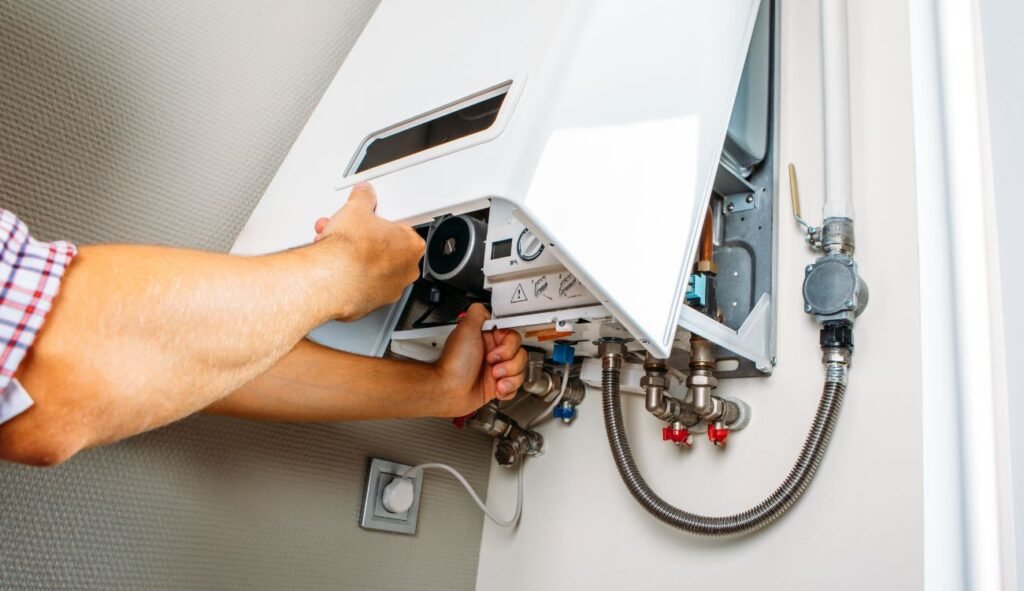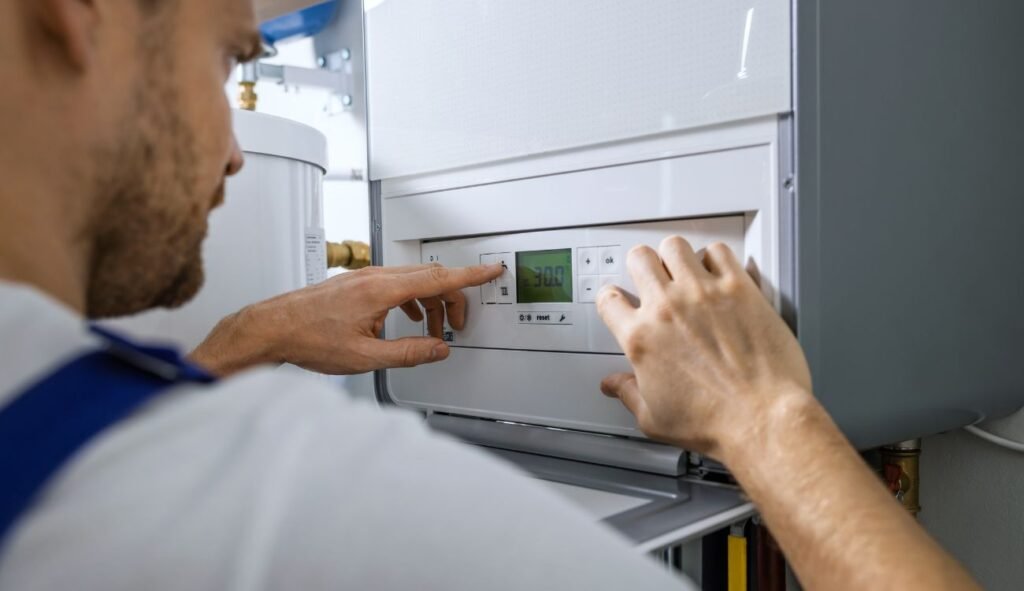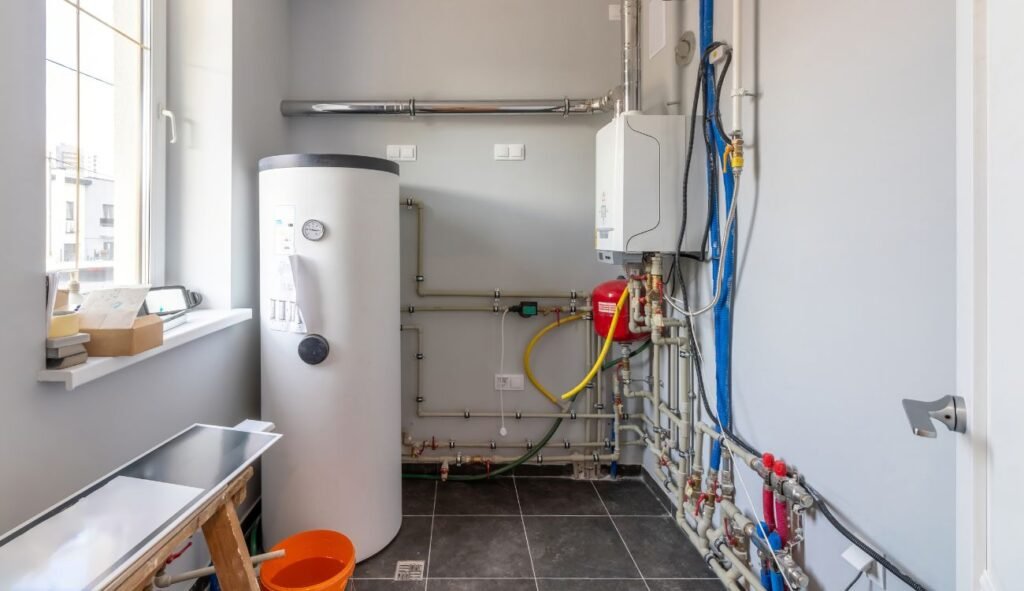Debating between an electric boiler vs heat pump for your home’s heating needs? We will break down the differences in efficiency, costs, installation, and environmental impact to help you make an informed decision.
Electric Boiler vs Heat Pump: A Quick Comparison
What are Electric Boilers?
Electric boilers are designed to generate heat using electricity instead of gas.
They function by passing an electric current through a metal heating element to heat water, providing instant hot water. This process is straightforward and highly efficient, making electric boilers a reliable source of direct electric heating and hot water.
What are Heat Pumps?
Heat pumps rely on a different principle. They draw heat from the air or ground to warm homes and supply hot water. Air source heat pumps, for example, utilise outside air to generate heat for home heating.
Ground source heat pumps depend on underground pipes to gather heat energy from the earth. Both systems are components of low-carbon heating solutions that considerably lower emissions compared to traditional gas boilers.
The main difference is in their method of collecting and delivering heat energy. While electric boilers directly convert electricity into heat, heat pumps transfer existing heat from outside sources into your home. This difference significantly impacts their efficiency and suitability for various home environments.
Electric Boilers vs Heat Pumps: Key Differences
In terms of efficiency, both electric boilers and heat pumps offer distinct advantages.
Electric Boilers
Electric boilers are highly efficient, often achieving up to 100% efficiency. They convert almost all the electricity they consume into heat, which is impressive, especially when comparing different types like condensing vs non-condensing boilers. Yet, this efficiency doesn’t always mean lower energy bills because of the high electricity costs.
Heat Pumps
Conversely, heat pumps elevate efficiency significantly. They can achieve efficiencies of 300-400%, meaning they provide significantly more heat output per unit of electricity consumed.
This is due to their ability to transfer heat instead of generating it. Even in extremely cold weather, heat pumps maintain an efficiency of over 200%, ensuring that there is enough heat for homeowners while minimising heat loss.
This remarkable efficiency means that homeowners with heat pumps use three times less electricity compared to those with electric boilers, resulting in less electricity generated overall.
Essentially, while electric boilers excel at converting electricity to heat, heat pumps provide more heat for less electricity, making them more energy-efficient, particularly for long-term considerations.
Electric Boiler vs Heat Pump: Costs
Electric Boiler Costs
Installing a new boiler heating system requires evaluating both upfront costs and installation complexity. Electric boilers are typically easy to install.
Their simplicity and compact design allow fitting into existing spaces with minimal disruption, making them cost-effective with installation costs between £3,000 and £4,200.
If you’ve decided on an electric boiler, Future Heat makes it easy to take the next step. We proudly serve Newcastle and the surrounding areas across the North East, offering expert installation and customer-focused service.
Request your electric boiler installation quote today and start your home upgrade with trusted local professionals.
Heat Pumps Costs
Heat pumps, on the other hand, need more space and involve more complex installations. The need for underground pipes for ground source heat pumps or outdoor units for air source models adds to the complexity.
Furthermore, installing a heat pump may require radiator upgrades or underfloor heating to optimise efficiency. These factors add to the higher initial costs, which range from £7,000 to £49,000.
Though the initial investment is higher, the long-term benefits of heat pumps in terms of efficiency, running costs, and maintenance costs make them a worthwhile consideration. Weighing these costs and complexities allows for a balanced view of short-term expenses versus long-term savings and environmental benefits.
Running Costs and Energy Bills
Running costs and energy bills are key considerations when selecting a heating system. Despite their high efficiency, electric boilers can incur higher energy costs because of electricity prices.
A 12kW electric boiler has an annual running cost of approximately £4,880. This high cost of electricity is a significant consideration for homeowners looking to manage their energy bills.
Conversely, heat pumps provide much lower running costs. For example, a heat pump with a Seasonal Coefficient of Performance (SCoP) of 4.5 might cost only £379 annually to run.
This stark difference is due to heat pumps’ higher efficiency and ability to use less electricity to produce the same amount of heat energy, especially when considering the heat pump tariff.
Some electric storage boilers can benefit from off-peak electricity rates to lower costs, but they generally remain higher than heat pump costs. Thus, although heat pumps have a higher upfront cost, their lower running expenses can result in significant long-term savings, making them appealing for long-term energy efficiency and cost-effectiveness.
Environmental Impact
The environmental impact of heating systems is an increasing concern for many homeowners. Both electric boilers and heat pumps emit zero emissions at the point of use, greatly reducing their carbon footprint compared to traditional fossil fuel systems. However, the broader environmental benefits of each system differ.
Heat pumps are notable for reducing carbon emissions by over 50% compared to fossil fuel heating systems. They utilise renewable energy sources, which enhance their role in reducing greenhouse gas emissions.
Powered by renewable energy, heat pumps can operate at nearly zero running costs, offering a more sustainable and eco-friendly heating solution.
Electric boilers also aid in low-carbon heating systems and home decarbonisation when paired with renewable energy sources such as solar panels. However, the manufacturing and disposal processes of heat pumps can affect the environment, though technological advancements are continually enhancing their sustainability.
Overall, heat pumps are viewed as a superior system environmentally due to their higher efficiency and use of renewable energy.
Suitability for Different Homes
Selecting the appropriate heating system depends on your home’s specific characteristics. Heat pumps are generally more effective in well-insulated homes, as they deliver heat gradually. This makes them perfect for modern, energy-efficient homes where consistent temperature maintenance is important.
Ground source heat pumps are especially suited for larger properties because they require extensive underground pipe systems. For properties over 100 square meters, a heat pump with at least 5 kilowatts capacity is needed for adequate heating. Additionally, heat pumps function efficiently even in sub-zero temperatures, making them reliable for various climates.
Yet, not all homes are suitable for heat pumps. The need for outdoor air space for air source heat pumps or even more outdoor space for ground source models can be a limiting factor. Therefore, electric boilers might be more practical for smaller homes or properties lacking sufficient outdoor space.
Noise Levels and Maintenance
Noise levels and maintenance needs are important factors when choosing a heating system. Modern heat pumps are engineered to be quieter than their predecessors.
For instance, the aroTHERM plus air source heat pump emits as low as 54 decibels at three meters, similar to a modern refrigerator’s noise level. Ground source heat pumps are usually even quieter, generating minimal noise during operation.
Heat pumps need regular maintenance to ensure peak performance, usually requiring servicing at least once a year for heat pump owners. Anti-vibration feet on the outdoor unit can further reduce noise, making them less intrusive in daily life. Air conditioning systems can also benefit from similar maintenance practices.
Electric boilers also require maintenance, but their simpler design often means lower costs. Overall, while both systems need periodic servicing, heat pumps are preferred for their quieter operation and innovative design.
Government Incentives and Grants
Government incentives and grants can greatly offset the initial costs of installing heat pumps, making them more accessible. For instance, the Boiler Upgrade Scheme offers financial aid to those replacing fossil fuel heating systems with heat pumps or biomass boilers, lowering the average cost of heat pump installation to about £5,100.
Residents in Scotland have additional options, like interest-free loans or grants, to improve their UK homes and create a well-insulated home. These financial incentives are critical in making the transition to sustainable heating solutions affordable for more people, especially when considering the support from energy companies and the impact on energy use.
These government grants and incentives are part of broader regulatory assistance project efforts by the UK government to promote low-carbon technologies and help the UK meet its environmental targets.
Frequently Asked Questions (FAQs)
Switching to a heat pump often requires larger surface area radiators or underfloor heating, but compatibility depends on your current setup. An assessment by a heating engineer is essential.
Electric boilers are often more practical in flats due to easier installation and space-saving, whereas heat pumps may not be viable unless there’s outdoor space and good insulation.
Both are viable, but heat pumps are usually more efficient long-term. However, electric boilers can be simpler to install and may suit smaller, less insulated off-grid properties.
Electric boilers require less maintenance as they have fewer moving parts. Heat pumps need annual servicing and regular checks to maintain efficiency.
Yes, in some hybrid systems, an electric boiler can act as a backup to a heat pump in colder weather or for hot water demand.
Our Verdict
To round things off, both electric boilers and heat pumps offer distinct advantages and are suitable for different scenarios. Electric boilers are highly efficient, easy to install, and ideal for smaller homes or properties with space constraints. However, their higher running costs can be a drawback.
Heat pumps, on the other hand, offer exceptional efficiency, lower running costs, and significant environmental benefits. They are particularly effective in well-insulated and larger homes, but come with higher upfront installation costs and complexity.
Ultimately, the best heating solution for 2025 depends on your specific needs, home characteristics, and long-term goals. By weighing the pros and cons of each system, you can make an informed decision that balances efficiency, cost, and environmental impact.
Myles Robinson is a seasoned expert in the boiler and home improvement industry, with over a decade of experience. He is deeply committed to environmental sustainability, actively promoting energy-efficient heating solutions to help households reduce their carbon footprint. By combining industry expertise with a dedication to environmental responsibility, Myles continues to lead efforts in transforming home heating practices towards a more sustainable future.

